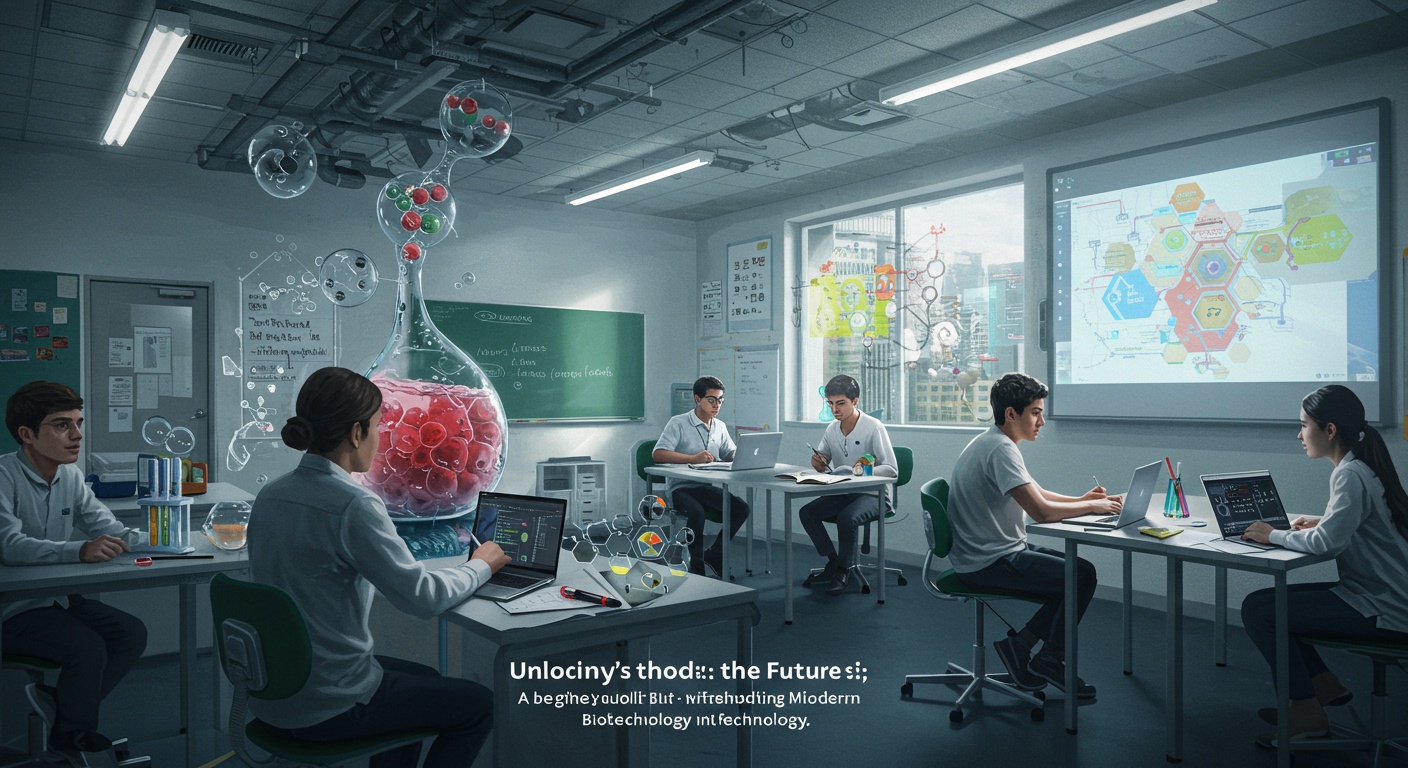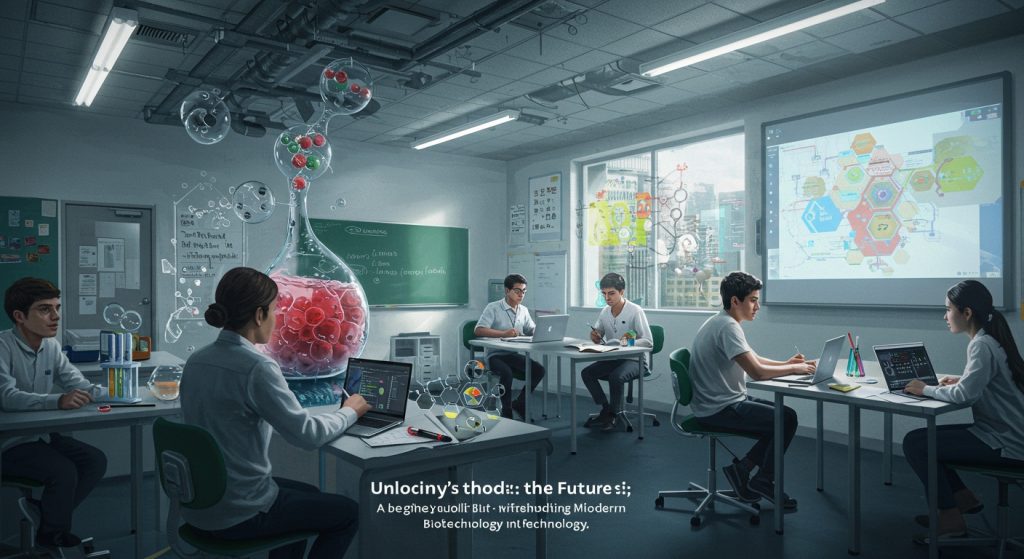Imagine a future where genetic diseases are curable, sustainable food sources proliferate. Bio-engineered materials revolutionize industries. This emerging reality is the profound impact of modern biotechnology, a transformative field fundamentally reshaping our world. From the rapid development of mRNA vaccines during global pandemics to precision gene editing with CRISPR for therapeutic applications and the cultivation of lab-grown meat, biotechnology harnesses living systems and biological processes to address critical challenges. It represents a powerful convergence of biology and technology, driving innovations that redefine healthcare, agriculture. Environmental sustainability. Grasping this dynamic discipline is essential, as its breakthroughs are not merely scientific curiosities but foundational shifts unlocking unprecedented possibilities for humanity’s progress.

Understanding the Core: What is Biotechnology?
In its simplest form, biotechnology is about harnessing biological processes for technological purposes and human benefit. It’s an ancient practice, dating back thousands of years to when our ancestors first brewed beer or made cheese, utilizing microorganisms to transform raw materials. But what is biotechnology definition in the modern era? Today, it refers to the application of scientific and engineering principles to the processing of materials by biological agents to provide goods and services.
Think of it as a dynamic field where biology meets technology. It’s not just about what happens in a lab; it’s about translating complex biological knowledge into practical solutions that impact our daily lives, often in ways we don’t even realize. From the medicines we take to the food we eat and even the fuels that power our vehicles, biotechnology is increasingly at the forefront of innovation.
The Pillars of Modern Biotechnology: Key Technologies
Modern biotechnology is built upon several foundational technologies that have revolutionized what’s possible. These aren’t just abstract concepts; they are the tools scientists use to manipulate life at its most fundamental levels.
- Genetic Engineering (Recombinant DNA Technology)
- CRISPR-Cas9 (Gene Editing)
- Bioinformatics
- Cell Culture and Tissue Engineering
- Bioprocessing and Fermentation
This is perhaps the most well-known aspect. It involves precisely modifying an organism’s genetic material (DNA). Imagine being able to “cut and paste” specific genes. Early breakthroughs, like the ability to produce human insulin in bacteria in the 1970s, showcased its immense potential. This technology allows us to introduce new traits, remove undesirable ones, or even create entirely new genetic sequences.
A game-changer in genetic engineering, CRISPR is a revolutionary tool that allows scientists to make incredibly precise changes to DNA. It’s like having a highly accurate pair of molecular scissors that can target and modify specific genes with unprecedented ease and efficiency. The discovery of CRISPR has dramatically accelerated research into genetic diseases and opened new avenues for therapeutic interventions.
This interdisciplinary field combines biology, computer science. Statistics. With the explosion of biological data (like entire genome sequences), bioinformatics provides the computational tools and techniques needed to store, retrieve, examine. Interpret this vast details. Without bioinformatics, the sheer volume of data generated by genetic sequencing projects, such as the Human Genome Project, would be overwhelming and uninterpretable.
This involves growing cells or tissues outside their natural environment, often in a laboratory setting. This allows for studying cellular processes, producing therapeutic proteins, or even growing replacement tissues and organs for medical purposes. For instance, skin grafts for burn victims are a direct application of tissue engineering.
This is where biological systems (like microbes or enzymes) are used on an industrial scale to produce various products. From pharmaceuticals and vaccines to biofuels and industrial chemicals, large bioreactors facilitate the controlled growth of microorganisms to yield desired compounds efficiently.
Biotechnology in Action: Real-World Applications Across Sectors
The impact of biotechnology is far-reaching, touching almost every aspect of our lives. Here are just a few examples that highlight its diverse applications:
Healthcare (Red Biotechnology)
Red biotechnology focuses on medical and pharmaceutical applications. It’s perhaps where most people first encounter the benefits of this field.
- Therapeutics
- Vaccines
- Diagnostics
- Gene Therapy
The production of life-saving drugs like insulin for diabetics, growth hormones. Various antibodies using genetically engineered microorganisms. Before this, many of these vital compounds had to be extracted from animal sources, which was often costly, inefficient. Sometimes led to allergic reactions.
Modern vaccines often utilize biotechnological approaches, such as recombinant protein technology or mRNA technology, to stimulate an immune response more effectively and safely. The rapid development of COVID-19 vaccines is a testament to the power of modern biotechnology.
Biotechnological tools are crucial for rapid and accurate disease diagnosis, from PCR tests for infectious diseases to genetic screening for predispositions to certain conditions or early cancer detection.
This revolutionary approach aims to treat genetic diseases by correcting faulty genes. While still in its early stages for many conditions, successes have been seen in treating certain forms of blindness and spinal muscular atrophy.
Agriculture (Green Biotechnology)
Green biotechnology applies to agricultural processes, aiming to improve crop yields, enhance nutritional value. Reduce the need for harmful pesticides.
- Genetically Modified (GM) Crops
- Biofortification
- Improved Animal Breeding
Examples include crops engineered to resist pests (e. G. , Bt corn, which produces its own natural insecticide), tolerate herbicides, or withstand extreme weather conditions. This can lead to reduced pesticide use, higher yields. More resilient food systems. While controversial for some, scientific consensus generally supports the safety of approved GM crops.
Developing crops with enhanced nutritional content, such as “Golden Rice” engineered to produce beta-carotene (a precursor to Vitamin A), addressing nutrient deficiencies in vulnerable populations.
Biotechnology can enhance livestock productivity, disease resistance. Product quality through genetic selection and reproductive technologies.
Industrial (White Biotechnology)
White biotechnology refers to industrial applications, leveraging biological processes to create more efficient and environmentally friendly manufacturing processes.
- Biofuels
- Bioplastics
- Enzyme Production
Producing fuels like ethanol and biodiesel from biomass (plant material) using microorganisms, offering a renewable alternative to fossil fuels.
Developing biodegradable plastics from renewable biological resources, reducing reliance on petroleum-based plastics and mitigating plastic pollution.
Using genetically engineered microbes to produce industrial enzymes for detergents, textiles, food processing. Paper manufacturing, often leading to less harsh chemical usage and lower energy consumption.
Environmental (Blue and Grey Biotechnology)
While blue biotechnology specifically relates to marine and aquatic applications, grey biotechnology broadly covers environmental applications.
- Bioremediation
- Wastewater Treatment
- Biosensors
Using microorganisms to clean up pollutants in contaminated soil and water. For example, specific bacteria can break down oil spills or degrade industrial waste.
Biological processes are fundamental to modern sewage treatment plants, where bacteria are used to break down organic matter and remove nutrients from wastewater.
Developing biological sensors to detect pollutants or specific chemicals in the environment, providing rapid and accurate monitoring capabilities.
Ethical Considerations and the Future of Biotechnology
As with any powerful technology, biotechnology comes with significant ethical, social. Legal considerations. Issues like gene editing in humans, the ownership of genetic data, equitable access to biotechnological innovations. Potential ecological impacts of genetically modified organisms are subjects of ongoing debate and careful regulation. Responsible innovation is paramount.
Looking ahead, the future of biotechnology is incredibly promising. We’re on the cusp of breakthroughs in personalized medicine, where treatments are tailored to an individual’s unique genetic makeup. New gene-editing technologies continue to emerge, offering even more precision. The integration of artificial intelligence and machine learning with biotechnology (often termed ‘Bio-AI’) is accelerating discovery and development at an unprecedented pace. From tackling climate change to curing previously incurable diseases, biotechnology holds the key to many of humanity’s grand challenges.
Embracing a basic understanding of modern biotechnology, including what is biotechnology definition, allows us to better engage with these discussions and appreciate the profound impact this field will continue to have on shaping our future.
Conclusion
You’ve now taken your first vital steps into the exhilarating world of modern biotechnology, a field rapidly redefining everything from medicine to agriculture. We’ve explored core concepts and glimpsed its vast potential, from groundbreaking mRNA vaccine technology, which reshaped global health, to the precision of CRISPR gene editing, revolutionizing disease treatment and diagnostics. My personal tip for continuing this journey is simply to stay curious and engage actively. Don’t let the complex terminology deter you; instead, focus on the ‘why’ behind each innovation. For instance, consider how synthetic biology is now designing sustainable materials, or how personalized medicine, a huge current trend, promises tailored treatments based on individual genetic makeup. It’s truly a domain where yesterday’s science fiction becomes today’s reality. The future of biotechnology is not just for scientists; it’s for all of us. By understanding its principles and ethical considerations, you are empowered to participate in critical discussions and appreciate the profound changes unfolding around us. Embrace this knowledge, for you are now better equipped to navigate. Even contribute to, the future ‘Unlocked’ by biotechnology.
More Articles
Unlocking Future Innovations: Exploring Germany’s Leading Biotechnology Hubs and Research Opportunities
The Green Side of Genetic Engineering: Exploring Positive Environmental Applications
The Moral Maze of Biotech: Understanding Key Ethical Debates and Concerns
Top Biotechnology Career Paths: Discover Your Future in This Growing Industry
Understanding Biotechnology: A Beginner’s Guide to This Revolutionary Scientific Field
FAQs
What exactly is modern biotechnology?
It’s essentially using living organisms or their parts (like cells or DNA) to create products or solve problems. Think of it as biology meets technology, applied to areas like medicine, agriculture. Industry.
Why should a beginner like me bother learning about this stuff?
Because modern biotechnology is rapidly changing our world! From new medicines and sustainable food sources to cleaner energy, understanding it helps you grasp major global advancements and make informed decisions as a citizen.
Is ‘Unlocking the Future’ really for total beginners, or do I need a science degree?
Absolutely for total beginners! This guide is designed to break down complex concepts into easy-to-comprehend language. You don’t need any prior science background – just curiosity.
Can you give me a few real-world examples of modern biotech?
Sure! Think about CRISPR gene editing, which can fix genetic defects; developing vaccines for diseases like COVID-19; creating drought-resistant crops; or even using microbes to clean up oil spills. These are all products of modern biotech.
How does biotechnology impact my everyday life?
More than you might realize! The food you eat (genetically improved crops), the medicines you take (biologic drugs, insulin), the detergents you use (enzyme-based). Even some biofuels – all have roots in biotechnology.
What are some big ethical questions around biotechnology that the guide might touch on?
It definitely covers them. Key ethical discussions often revolve around gene editing in humans (designer babies?) , the safety of genetically modified organisms (GMOs). Data privacy related to genetic data. It’s crucial to interpret these debates.
What exciting possibilities does the future of biotech hold?
The future is incredibly promising! We’re looking at personalized medicine tailored to your DNA, growing organs for transplant, new ways to combat climate change. Even potentially extending human lifespan. It’s truly a field with endless innovation.



